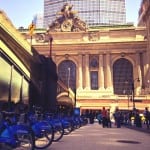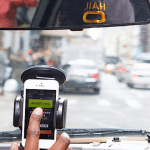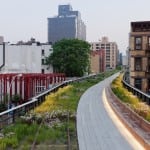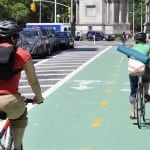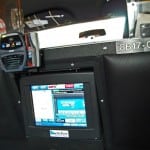Skift Take
The city is an urban playground for visitors and locals alike and we'd like to see its new leader take inspiration from his sometimes dictatorial and always opinionated predecessor.
- Citibike launched in May, connecting neighborhoods with pedal power.
- New York City launched its first pilot program for taxi e-hail apps in 2013.
- The idea of transforming the Highline from a rusty railroad track to an elevated park did not gain city support until 2002 when Mayor Bloomberg was elected.
- More than 400 miles of bike lanes have been added to New York City streets during Bloomberg’s mayorship.
- Televisions were added to the backseats of yellow cabs in 2007.
- Select Bus Service, New York City’s term for rapid bus transit, was introduced in June 2008 as joint venture of the NYC DOT and MTA.
Yesterday New York City elected its first new leader in 12 years, and mayor-elect Bill De Blasio has some very big, not to mention expensive, shoes to fill.
His predecessor Michael Bloomberg used his dozen years in power to help re-invent the way New York City welcomes travelers and keeps its locals moving in ways that had not been seen since the mega-planning and wholesale urban re-invention (and sometimes destruction) days of city planner Robert Moses.
Bloomberg gave the city bikeshare and bike lanes, pedestrian plazas, the High Line, and taxi-hailing apps. He often did so by giving his transportation commissioner Janette Sadik-Khan extreme powers to make moves under cover of darkness or against the wishes of vocal car-loving neighbors.
We liked it.
But there are a few messes the new New York City mayor is stepping into that we’d like to see tackled to improve the quality of life for both visitors and residents as they move about the U.S.’s best city.
New Economy Clarity, Part 1: Uber CEO Travis Kalanick pushed his car hail app on the city whether it wanted it (consumers did) or not (the Taxi & Limousine Commission didn’t). His ballsy moves made the city move quicker to update its regulations, though, and it began a taxi e-hail trial in June. Outside of Uber, Hailo is also taking advantage of the pilot program while car-sharing services Lyft and Sidecar are carefully creeping into the city, too.
In his previous job as Public Advocate, De Blasio sided with the taxi industry in regards to an outer-borough hailing program (the same one Mayor Bloomberg said he wanted to “fucking destroy”), as well as accepted $250,000 in campaign donations from the industry. Luckily for Uber and Hailo, the e-hail pilot is already legal.
What to Do: The new mayor needs to figure out how to protect consumers while making sure that they can take advantage of technology that helps them find transportation faster than before.
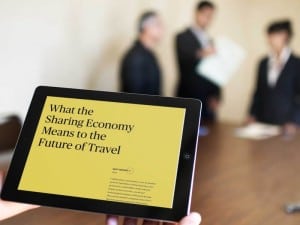
Read more about what collaborative consumption and the sharing economy mean to the future of travel.
New Economy Clarity, Part 2: Apartment/vacation rental site Airbnb has made New York City the beachhead in its battle against regulations that turn a large portion of its hosts into lawbreakers. Its currently fighting the state attorney general’s attempt to look at its vast user database to see how far Airbnb’s description of its users as just simple folks diverges from reality.
DeBlasio has gone on record saying Airbnb activity negatively affects neighborhoods, but some last-minute campaign gifts from the company’s founders may get them another shot to plead their case.
What to Do: The city needs to decide to either create new laws or finally begin enforcing the current laws so that hosts aren’t left in limbo and residential buildings don’t continue to be turned into transient hotels.
Bicycles Vs. Cars Vs. Pedestrians: The city’s 400 miles of bike lanes are disliked by the city’s most obnoxious drivers, but they’re an important step to keep people moving efficiently. And while some neighborhoods are still up in arms about having to share the road, others have figured out it’s not so bad.
The city’s successful roll out of the Citibike bicycle-share program in May has put more bikes on the streets for both locals and visitors. It’s big, blue visibility gives riders a prominence they didn’t have before and the mass of bikes is slowly training drivers to better recognize the people they need to share the road with.
What to Do: Enforce existing laws and crack down hard on drivers with extraordinarily obscene fines when they act aggressively towards cyclists and pedestrians. Also make sure cyclists and pedestrians behave until everyone learns how to get along.
City-Wide Wi-Fi: In a city where it’s difficult to take a call on AT&T in Times Square, it’s a relief that you can get Wi-Fi service in some Manhattan subway lines. The patchwork of service that’s turned old phone booths into Wi-Fi hotspots, blanketed some parks with Wi-Fi, and brought it underground as well should be rolled out across the city much in the same way everyone has water and electricity.
What to Do: Make New York City the model city for municipal Wi-Fi. It’s the right mix of populism for a radical-turned mayor, and a great way to tell business leaders you’re ready to invest in the future, as well as make it easier for visitors to communicate what a great time they are having in the city.
Airport Sanity: New York is home to three relatively terrible airports — Newark, La Guardia, and JFK — that routinely top worst airport terminals lists. They are difficult to get to — even with the addition of rail connections at two of them — and once you’re there they are an unreliable mess of half-finished terminals, poor food service, and long security lines. They scream “we don’t want you here” in many different languages. And that doesn’t even begin to address the customs and passport control mess.
What to Do: Since the airports are run by the Port Authority, the mayor can’t control them as he’d like to. But he can use a bully pulpit to express this disgust that all travelers feel when transiting through New York.
Green Spaces and Sidewalk Seats: Several of the city’s most visited and loved locations were nothing but rusty railroad tracks until Mayor Bloomberg pushed for their revival. The Highline became one of the world’s most visited landmarks, greenery appeared under the Brooklyn Bridge, grassy sports fields were built along the East River, and waterfronts in Queens and Brooklyn were revitalized.
Tourists will have a slightly more pleasant time walking through Times Square once construction is completed and can navigate more easily with way-finding maps on the streets due to the efforts of transportation commissioner Sadik-Khan.
What to Do: Keep going. The introduction of well-designed green spaces and pedestrian areas will help New York City slowly catch up to the better designed and more livable cities of Europe. This is good for New Yorkers in every borough, and visitors from everywhere.
Dwell Newsletter
Get breaking news, analysis and data from the week’s most important stories about short-term rentals, vacation rentals, housing, and real estate.
Have a confidential tip for Skift? Get in touch

